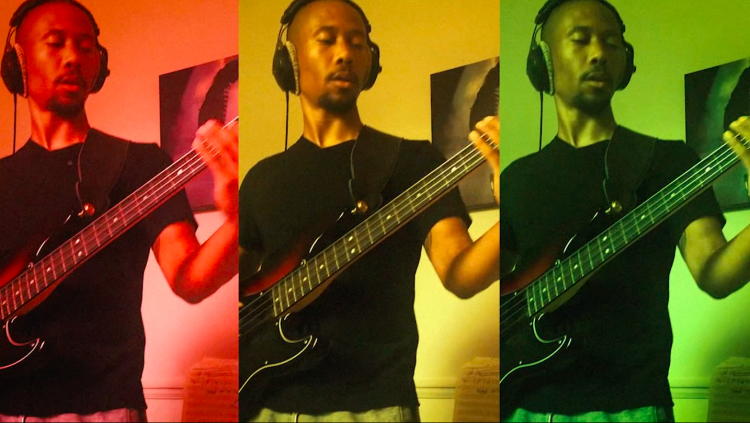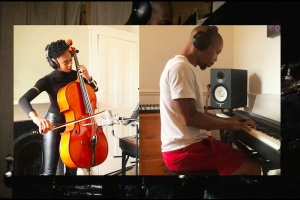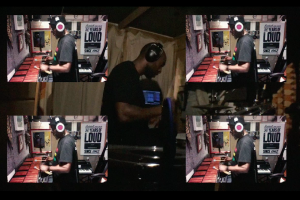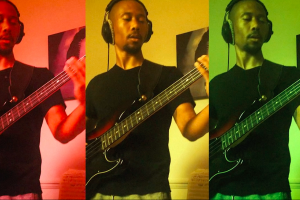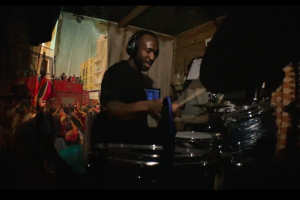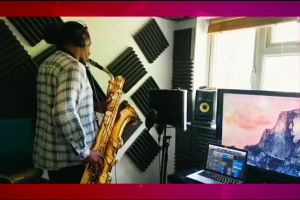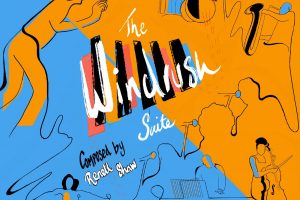Windrush Day marks the historic voyage of 492 West Indians on the HMT Empire Windrush arriving at the Port of Tilbury in Essex on 22 June 1948. It honours the Caribbean community that started arriving on that day seventy-two years ago, a process that enriched British life and culture but also kickstarted a nefarious programme of racist profiling by the state in successive Immigration Bills leading inexorably to the “Hostile Environment” and the 2013 “Windrush Scandal”. Multi-instrumentalist and composer Renell Shaw’s Windrush Suite pays homage to that pioneering generation and aims to paint a musical portrait of their experiences and difficulties.
Foreseeing what seemed a quiet Windrush Day this year, Kathianne Hingwan (Vortex General Manager and Artistic Producer for the project) commissioned Renell with support from the PRS Foundation and the Vortex’s Shape Of Jazz To Come series. Introductions from jazz legend Dave Holland and Kevin Le Gendre (author of Don’t Stop the Carnival: Black Music in Britain) accompanied the Windrush Day broadcast of the Suite along with Coco Shaw’s montage of archive material with the musicians recording the Suite’s four movements “The Vision They Had”, “Bacchanal”, “Out of Many”, and “Purgatory”.
Renell Shaw sets out the musical material on piano, guitar and bass, locking in with drummer Samson Jatto in tight and heavy but spacious grooves, patiently introducing by turns Ayanna Witter-Johnson on cello, and Orphy Robinson whose marimba adds colourful majoring to the more ambivalent minor-tinged tonalities of the haunting and earnest piano-led chord structure. The soloists segue longer episodes of spoken word recordings Renell Shaw has made, some with family members. These are powerful and moving first-person accounts.
Announcing on screen “A Love Story” the opener “The Vision They Had” focuses on the economic realities of the diaspora experience: “Wages were still puny”; and today, in spite of “Working for a pittance all these years” you’d still have people thinking you must be begging. The Windrush generation directly experienced the undisguised discrimination of “no blacks no dogs” when trying to find accommodation. In 1957 the BBC’s Tonight programme followed 18-year old St Lucian Ben Bousquet around Brixton. British TV’s first documentary about race put on screen the and ‘I-would-but-‘ excuses and nimbyism of the white public, and how this ghettoised black populations, forcing them into unsafe and crowded conditions.
The effect of day-in day-out of discrimination and the ongoing hostile environment is incalculable. Stories like Bousquet’s and those of the unnamed voices in the Windrush Suite are still commonly heard today: living three in one room, having to prove that you can use the machines in the workplace, having to continually bow to the prejudices of white folk. The advice in the Suite is typically pragmatic rather than revolutionary: “You’ve got to be diplomatic. You only let go as much as you want to.”
At the start of second track “Bacchanal” Renell raps “There’s a whole lot of history here from before: they still don’t like blacks but they can’t say it like that”: reflecting how racists rail against political correctness in a barely disguised frustration with prohibitions on racism. This goes way back. Harold Macmillan’s 1962 Immigration Act redefined the terms to discriminate on “employment prospects”, which was “the only working method without “ostensibly” discriminating on basis of colour”. That word “ostensibly” really is the key to their modus operandus here: the continuing attempt by the British state to define ‘Britishness’ on racial terms. Windrush was significant because at that time being born in Commonwealth countries automatically entitled you to British citizenship. This would change.
Following the Second World War the British state was desperate for labour. The Windrush passenger manifest lists 85 mechanics, 54 carpenters, 39 clerks, 23 welders, 20 engineers, 15 machinists, 14 fitters, 13 electricians, as well as plumbers and carpenters. These underpaid skilled workers were shown no gratitude from the start. Before they had even arrived Prime Minister Clement Attlee had written a letter to MPs about an “incursion” beginning “I regret to inform you…”. In 1951 Winston Churchill was re-elected on a campaign centred on the slogan “Keep Britain White”.
The ‘Windrush Scandal” refers to the decision in 2013 to deport members of the Windrush Generation and their children, people who had lived in Britain nearly their whole lives. After 60 years of legislative fudging the white state redefined citizenship in a manner that removed the citizenship of its own subjects making it easy for them to be deported by the immigration authorities. As part of this strategy Landlords and employers became instruments to police nationality and citizenship. Landlords and employers are forced to police nationality. The conditions of the 1971 Immigration Act sets the limits and includes the key clause that if an individual is deemed non-British it is incumbent upon “the person asserting it to prove that he is”.
Prejudice has been institutionalised over decades, displacing structural racism into new forms of discriminatory profiling: it used to be yardies, now it’s hoodies and gangs on estates. “We ain’t even try to make peace no more” is how it is, with a police militia mobilised against the black community. On “Bacchanal” the riffing sax of Taurean Antoine-Chargar adds texture and atmosphere as well as a lightness and reflective sheen to the hard-driven groove expressing the sensuous gyrations of the body. Nandi’s atmospheric wordless vocals soar but their power also drive the energy. The musical track is intense and brooding and direct, with a contained sense of anger. Images of Notting Hill Carnival are projected across the backdrop. The West London festival is identified here with a boozy ‘bacchic’ as much as a ‘bacchanal’. To many it can feel more like a corporate sponsored parade than an awareness-raising celebration.
Coco Shaw’s visual accompaniment to the suite has some nice moments including shaking seasoning cans as percussion, a nice redeployment of iconic cultural totems. Renell is pictured in triplicate red, yellow and green filters. Sonically, the production is clear and punchy, but there are some dislocations as Orphy Robinson’s contribution and Taurean’s sax sometimes evidence the separation of the parts in the recording. This is only really solvable by playing in the room together, which at present is impossible. Musically, the work is fresh, recalling the London sound of a futurism that allies an electronically tinged texture with a strongly organic feel. It will be great to hear it played live, as must surely happen at some point in the future, assuming any venues survive the current conflagration of the arts. There is a sad irony that the poverty-stricken troubadours of Windrush did more to nurture the creative infrastructure of Britain than the Tory governments holding the purse strings.
As Kevin LeGendre notes, “the Suite is a celebration of those who gave so much who had so little to their names, to their staying-power and conviction, that they had a place in a world of their own making.” In his remarks mid-way through the Suite’s video stream on Windrush Day, he described the arrival of the HMT Empire Windrush as a pivotal event in British history. Famous footage of Calypso musician Lord Kitchener performing “London is the place for me” as the ship docked is iconic. Among noted artists on board were vocalist Mona Baptiste and jazz trumpeter Dizzy Reece, pointing to an uplifting cultural enrichment identifiable today from carnival to the speech rhythms found in communities all over the land. He says, “Windrush was a wind of change for us.”
At the start of the third part “Out of Many” the screen fills with “Umoja”, the Swahili word for unity. This part owes more to soul music with Nadi’s vocals and the impressionistic piano. Spacious and building, the group unity builds slowly into a kind of ‘chamber soul music’ with the cello top-line asserting a classical flavour. Renell is making contemporary and new music without pastiche, which makes it a very different experience to the stylistic bricolage of Soweto Kinch’s large-scale project The Black Peril which covered similar themes of black British experience after the First rather than the Second World War.
The people of the Caribbean weren’t united as such until their arrival in the UK, and then what chiefly united them was their common experiences of racism. An irony develops to the theme of Umoja. The twinned mantras “Out of one come many” and “Out of many come one” assert the crucial central and over-arching philosophy that the suite espouses. It reaches out from the specifics of individual and group experiences into their meaning across our species, the need for unity. A long poem outlines the programme: “Until the philosophy that holds one race superior and another inferior is finally and permanently discredited […] until that day the dream of lasting peace and world citizenship and the rule of international morality will remain but a fleeting illusion to be pursued but never attained.”
It’s hard not to lose hope. The fourth and final movement “Purgatory” ends on a bit of a downer, and feels almost like a spoken word coda with more minimal accompaniment to the spoken word element that takes centre stage here against a meandering bassline. It has its charms, with tap dancing from Delycia Belgrave reflecting dance elements crucial to the musical experience of the diaspora. The seriousness of the issues pushes out the music a bit, with a troubling recording concerning the experience of children being sent back to the Caribbean.
The problems of raising children in the UK are severe and amount to an emergency; parents can’t afford to both work and have their children looked after. This was an experience that was especially problematic for the Windrush generation who were used to the more communal experience of raising families and struggled, isolated in the atomised nuclear units of England. It was the children of the Windrush generation who remained in the Caribbean while their parents went to England to work who would pay the highest price. A common remembrance in David Olusoga’s documentary is “I didn’t know my mum; she left us when I was five.”
The piece continues into reflections on racial abuse and the importance of “being equipped with knowledge to respond. Protest and reasons happening now are the same as forty years ago. The cycle seems to be repeated. There is an uprising, some warm words are said, a few concessions are made, people came down, the old atrocities return and a new generation gets upset and we go round again.”
Responding to this, the Suite concludes in a somewhat cursory fashion on a welcome note of hope, just one line, one importunement: “It’s time, we suggest, for REVOLUTION”. Yes! Yes! We concur. But then it ends. Perhaps if there’s the opportunity to expand the suite it could magnify its range, with less of the diplomatic pragmatism and more of the fire and fury and anger and possibility it tends only to hint at. Maybe if the work had been completed after, rather than before, the current resurgence of the Black Lives Matter conversation it might have taken on some of that energy. It’s an energy ripe for harnessing. It’s been seventy-two years since the Empire Windrush sailed. It was a quiet revolution, enriching a grey environment that was yet to explicitly define itself on racial terms as “hostile”. As the Windrush Suite suggests, it’s another revolution, a louder revolution, that is needed now. Last night Brixton was on fire again, as it was in the 1980s, as it was in 2011. If not now, when?
Download the Windrush Suite from Bandcamp:
AJ Dehany is based in London, locked down in Teesside, and writes independently about music, art and stuff. ajdehany.co.uk
